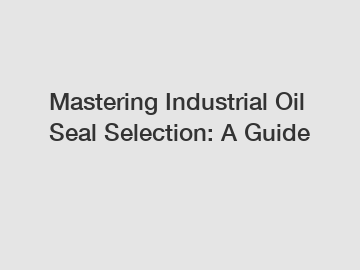Jan. 27, 2024
Automobiles & Motorcycles
You will get efficient and thoughtful service from SBT.
Mastering Industrial Oil Seal Selection: A Guide.
In any industrial setting, the selection of appropriate oil seals plays a crucial role in ensuring the smooth operation of machinery and equipment. Whether you are dealing with pumps, motors, or any other rotating element, understanding the different aspects of oil seal selection can help optimize performance, minimize downtime, and ultimately increase productivity. This article serves as a comprehensive guide to mastering the selection process, highlighting key factors and considerations.

1. Understanding the Basics of Oil Seals.
Oil seals, also known as rotary shaft seals or lip seals, are essential components used to prevent the leakage of lubricants, fluids, or gases in machinery. They are critical in maintaining the integrity of the sealing system and protecting the internal components from contaminants. Oil seals typically consist of an outer metal casing, a rubber or elastomeric sealing lip, and a spring to ensure proper sealing force.
2. Identifying the Operating Conditions.
The first step in selecting an oil seal is identifying the specific operating conditions it will be exposed to. Factors such as temperature, pressure, speed, and media compatibility greatly influence the type of seal required. Understanding the application environment enables you to choose seals with the necessary characteristics, such as temperature resistance, chemical compatibility, or high-speed capabilities.
3. Choosing the Right Material.
Oil seals are available in various materials, each offering unique properties suitable for different applications. Common materials include nitrile rubber (NBR), fluorocarbon rubber (FKM), polytetrafluoroethylene (PTFE), and silicone rubber (VMQ). NBR is cost-effective and provides good resistance to oil and water, while FKM offers superior chemical resistance and high-temperature capabilities. PTFE is well-suited for extreme temperatures and aggressive chemicals, while VMQ is ideal for high and low-temperature applications.
4. Sizing and Installation Considerations.
Proper sizing and installation are critical for achieving optimal sealing performance. Oil seals should be selected based on shaft diameter, housing bore diameter, and the axial space available. It is important to consider the installation process and any potential misalignment issues. Additionally, adequate lubrication is essential to minimize wear and ensure efficient sealing.
5. Assessing Seal Performance.
To determine the performance of an oil seal, factors such as expected seal life, frictional effects, and leakage rates should be considered. Seal life is influenced by operating conditions, seal materials, and the presence of contaminants. High friction between the sealing lip and the shaft can generate heat, leading to premature failure. Leakage rates should be within acceptable limits to prevent any issues related to fluid loss.
6. Selection Tools and Expert Support.
The selection of oil seals can be challenging due to the multitude of options available. Fortunately, many manufacturers provide online tools and selection guides to assist in the process. These tools take into account the operating conditions, size requirements, and material preferences to suggest suitable oil seals. Additionally, seeking expert support from suppliers or technical teams can ensure accurate and reliable oil seal selection for specific applications.
In conclusion, mastering the selection of industrial oil seals is crucial for maintaining optimal operational efficiency in machinery and equipment. By understanding the basics, identifying operating conditions, choosing the right materials, considering sizing and installation, assessing performance, and utilizing selection tools or expert support, one can make informed decisions for successful oil seal selection. So, feel free to contact us for any further queries or assistance in finding the perfect oil seal for your specific application.
For more information, please visit our website.
If you want to learn more, please visit our website u type rubber oil seal in china.
If you are interested in sending in a Guest Blogger Submission,welcome to write for us!
All Comments ( 0 )